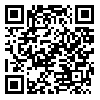Volume 8, Issue 1 (8-2020)
jmsthums 2020, 8(1): 14-23 |
Back to browse issues page
Download citation:
BibTeX | RIS | EndNote | Medlars | ProCite | Reference Manager | RefWorks
Send citation to:



BibTeX | RIS | EndNote | Medlars | ProCite | Reference Manager | RefWorks
Send citation to:
Z A, M V, H T, H E. Determinants of maternal nutritional behavior for children 6 to 12 months with FTT based on social cognitive theory. jmsthums 2020; 8 (1) :14-23
URL: http://jms.thums.ac.ir/article-1-736-en.html
URL: http://jms.thums.ac.ir/article-1-736-en.html
1- Department of Health Education and Health Promotion, Student Research Committee, Mashhad University o Medical Sciences, Mashhad, Iran
2- Department of Health Education and Health Promotion, Social Determinant of Health Research Center, Mashhad University o Medical Sciences, Mashhad, Iran
3- Mashhad University of Medical Sciences
4- گروه آمار زیستی، مرکز تحقیقات عوامل اجتماعی موثر بر سلامت، دانشگاه علوم پزشکی مشهد، مشهد، ایران
2- Department of Health Education and Health Promotion, Social Determinant of Health Research Center, Mashhad University o Medical Sciences, Mashhad, Iran
3- Mashhad University of Medical Sciences
4- گروه آمار زیستی، مرکز تحقیقات عوامل اجتماعی موثر بر سلامت، دانشگاه علوم پزشکی مشهد، مشهد، ایران
Abstract: (4879 Views)
Background & Aim: Failure to thrive (FTT) is one of the most common and important health problems in children aged 6 to 12 months. Maternal behavioral factors are amongst the most critical causes of FTT in children. One of the most important theories to improve the nutritional behaviors is social cognitive theory. This study was conducted aiming to identify the determinants of maternal nutritional behavior for children 6 to 12 months with FTT based on SCT.
Methods: This analytic study applied stratified sampling to select 475 mothers of children 6 to 12 months with FTT who referred to health service centers in Torbat Heydariyeh. Data were analyzed by SPSS-24.
Results: The mean age of mothers was 29 years and children was 8 months. Average score of mothers' behaviors of 6.6± 1.8. There was a significant positive correlation between mother's education, family income, age and weight of child with mother’s behavior (P<0.05). Regression results showed that Barrier self-efficacy, Outcome expectations and knowledge constructs had the most predictive effect on mothers' behaviors with 6 to 12-month-old children with FTT(P<0.05).
Conclusion: Based on our findings, barrier self-efficacy, outcome expectations and knowledge constructs, can be used to promote the maternal behavior for children 6 to 12 months with FTT.
Methods: This analytic study applied stratified sampling to select 475 mothers of children 6 to 12 months with FTT who referred to health service centers in Torbat Heydariyeh. Data were analyzed by SPSS-24.
Results: The mean age of mothers was 29 years and children was 8 months. Average score of mothers' behaviors of 6.6± 1.8. There was a significant positive correlation between mother's education, family income, age and weight of child with mother’s behavior (P<0.05). Regression results showed that Barrier self-efficacy, Outcome expectations and knowledge constructs had the most predictive effect on mothers' behaviors with 6 to 12-month-old children with FTT(P<0.05).
Conclusion: Based on our findings, barrier self-efficacy, outcome expectations and knowledge constructs, can be used to promote the maternal behavior for children 6 to 12 months with FTT.
Type of Study: Research |
Subject:
Special
Received: 2020/01/6 | Accepted: 2020/02/10 | Published: 2020/09/19
Received: 2020/01/6 | Accepted: 2020/02/10 | Published: 2020/09/19
Send email to the article author
| Rights and permissions | |
 | This work is licensed under a Creative Commons Attribution-NonCommercial 4.0 International License. |






